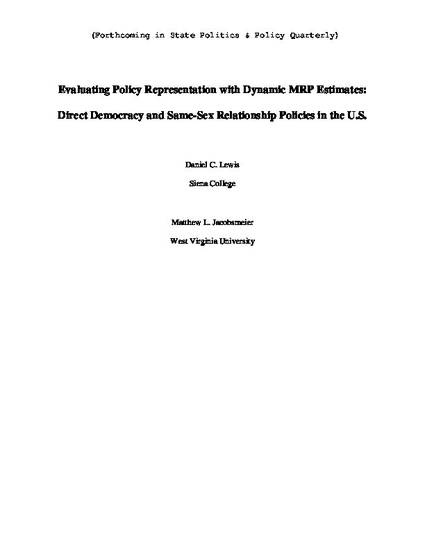
Article
Testing Policy Responsiveness with Dynamic MRP Estimates: Direct Democracy and Gay Rights in the U.S.
State Politics & Policy Quarterly, Forthcoming
(2017)
Abstract
Does direct democracy strengthen popular control of public policy in the U.S.? A major challenge in evaluating policy representation is the measurement of state-level public opinion and public policy. Though recent studies of policy responsiveness and congruence have provided improved measures of public opinion using multilevel regression and post-stratification (MRP) techniques, these analyses are limited by their static nature and cross-sectional design. Issue attitudes, unlike more general political orientations, often vary considerably over time. Unless the dynamics of issue-specific public opinion are appropriately incorporated into the analyses, tests of policy responsiveness and congruence may be misleading. Thus, we assess the degree of policy representation in direct democracy states regarding same-sex relationship recognition policies using dynamic models of policy adoption and congruence that employ dynamic MRP estimates of attitudes toward same-sex marriage. We find that direct democracy institutions increase policy responsiveness as well as congruence with issue-specific public opinion.
Disciplines
Publication Date
2017
Citation Information
Daniel C Lewis and Matthew L. Jacobsmeier. "Testing Policy Responsiveness with Dynamic MRP Estimates: Direct Democracy and Gay Rights in the U.S." State Politics & Policy Quarterly, Forthcoming (2017) Available at: http://works.bepress.com/matthew_jacobsmeier/8/
